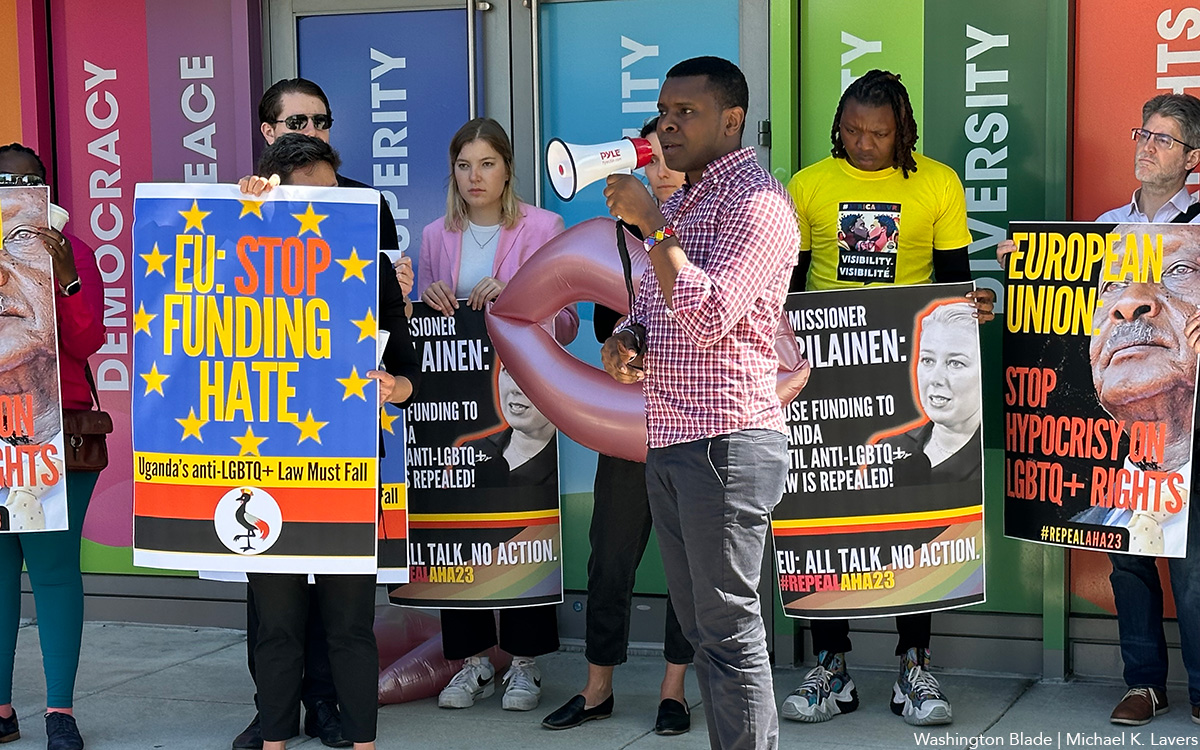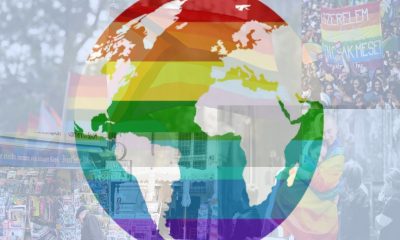World
New Zealand lawmakers approve same-sex marriage bill
The measure passed by a 77-44 vote margin.
The 77-44 vote is the second of three votes on the proposal.
“It was a pleasing result and the culmination of a lot of work from our LGBTI community in collaboration with people from across our society who believe in social justice,” lesbian Parliamentarian Louisa Wall, who introduced the measure, told the Washington Blade after the vote. “What was so heartening was the joining of youth leadership from across the political spectrum representing the eight political parties in our parliament who sent a strong message of support for and advocacy of equal rights under New Zealand for all citizens earlier in the week.”
Jackie Russell-Green of the New Zealand Campaign for Marriage Equality also welcomed the vote.
“We’re thrilled with last night’s result,” she told the Blade. “We’re now one closer to marriage equality in New Zealand.”
Canada, the Netherlands, Spain and South Africa are among the countries that allow gays and lesbians to tie the knot.
The British House of Commons last month overwhelmingly approved a bill that would allow same-sex couples to marry in England and Wales. The French Senate on April 2 will begin debating a proposal that would extend marriage and adoption rights to gays and lesbians.
The final vote on the same-sex marriage bill in the New Zealand Parliament is expected to take place in the middle of April.
Prime Minister John Key supports the measure, but Russell-Green and other proponents stressed they must remain vigilant in spite of the March 13 vote.
“We will need to be resolute as we progress to the third and final reading of the marriage equality bill,” Wall said. “So while the result was fantastic, there will be no celebration until the bill passes.”
European Union
Activists demand EU sanction Uganda over Anti-Homosexuality Act
Yoweri Museveni signed law on May 29, 2023

More than a dozen activists who protested in front of the European Union Delegation to the United States in D.C. on Thursday demanded the EU to sanction Uganda over the country’s Anti-Homosexuality Act.
Hillary Innocent Taylor Seguya, a Ugandan LGBTQ activist, and Global Black Gay Men Connect Executive Director Micheal Ighodaro are among those who spoke at the protest. Health GAP Executive Director Asia Russell also participated in the event that her organization organized along with GBGMC and Convening for Equality Uganda, a Ugandan LGBTQ rights group.
Ugandan President Yoweri Museveni last May signed the Anti-Homosexuality Act that, among other things, contains a death penalty provision for “aggravated homosexuality.”
The country’s Constitutional Court on April 3 refused to “nullify the Anti-Homosexuality Act in its totality.” A group of Ugandan LGBTQ activists have appealed the ruling.
A press release that Health GAP issued ahead of Thursday’s protest notes EU Commissioner for International Partnerships Jutta Urpilainen on March 6 announced more than €200 million ($212.87 million) for Uganda in support of “small business owners, young female entrepreneurs, agribusinesses as well as vital digital infrastructure projects in full Team Europe format with the European Investment Bank (EIB) and several member states.”
“These concrete initiatives will make a difference to aspiring entrepreneurs, Ugandan businesses and create jobs in multiple sectors,” said Urpilainen in a press release that announced the funds. “This is a perfect example of how Global Gateway can make a tangible difference for citizens and businesses and unlock the full potential of a partner country by working together.”
Convening for Equality Uganda on Tuesday in a letter they sent to Urpilainen asked the EU to review all funding to Uganda and “pause or reprogram any funds that go via government entities.” The protesters on Thursday also demanded European Commission President Ursula von der Leyen “to hold Ugandan President Museveni’s government accountable for this attack on human rights.”
Josep Borrell, the EU’s top diplomat, in a statement he released after Museveni signed the Anti-Homosexuality Act said the law “is contrary to international human rights law and to Uganda’s obligations under the African Charter on Human and People’s Rights, including commitments on dignity and nondiscrimination, and the prohibition of cruel, inhuman or degrading punishment.”
“The Ugandan government has an obligation to protect all of its citizens and uphold their basic rights,” said Borrell. “Failure to do so will undermine relationships with international partners.”
“The European Union will continue to engage with the Ugandan authorities and civil society to ensure that all individuals, regardless of their sexual orientation and gender identity, are treated equally, with dignity and respect,” he added.
Urpilainen last September in a letter to the European Parliament said the EU would not suspend aid to Uganda over the law.
India
Indian political parties for the first time include LGBTQ rights in election platforms
Voters will begin to cast ballots on April 19

The world’s largest democratic exercise will begin in India on April 19 as citizens begin to cast their votes in the country’s election.
This year’s election is different because national level political parties for the first time are promising to extend marriage rights to same-sex couples as part of their election platforms.
The Indian National Congress, one of India’s oldest political parties, promised after wide consultation that it would introduce a bill that would recognize civil unions between couples who are part of the LGBTQ community. The party, which has governed India for the majority of the period since independence from the U.K. in 1947, has refrained from taking a stance on laws that include Section 377, which criminalized consensual same-sex sexual relations.
Then-Health Minister Gulam Nabi Azad in 2011 when the INC was in power said homosexuality is a disease. He made the controversial comment while speaking at an HIV/AIDS conference in New Delhi, the Indian capital.
“Unfortunately, this disease has come to our country too,” said Azad. “Where a man has sex with another man, which is completely unnatural and should not happen but does.”
When the Delhi High Court was hearing the Naz Foundation case, the Home Affairs Ministry opposed the striking down of Section 377 based on its belief that homosexuality cannot be morally condoned. The INC never struck down Section 377, which criminalized homosexuality, in parliament.
A 5-judge panel on the Supreme Court on Sept. 6, 2018, decriminalized consensual same-sex sexual relations.
The Communist Party of India (Marxist) on April 4 unveiled its platform with a range of socialist commitments, including support for LGBTQ rights. Among these pledges is to amend the Transgender Persons (Protection of Rights) Act 2019 to address community concerns and ensure legal recognition and protection for same-sex couples akin to marriage.
The platform also outlined plans to introduce a bill similar to the Special Marriage Act of 1954, which allows partners to be listed as dependents and facilitating like inheritance, alimony in the event of divorce and other issues. The party further pledged to enact a comprehensive anti-discriminatory bill that would include LGBTQ people, ensure quotas in educational institutions and implement horizontal reservations in employment.
Addressing the issue of crimes against LGBTQ people, the platform promised to treat such offenses on par with crimes against heterosexuals. The platform also calls for tackling bullying, violence and harassment of gender non-conforming and LGBTQ people in educational settings, enforcing anti-hazing policies and combating hazing based on sexual orientation and gender identity.
The platform further touched issues related to transition and informed consent.
The Special Marriage Act of 1954 is a law that provides for civil unions among Indians and Indian nationals who live abroad, regardless of the religion or faith followed by either party. This law enables people from two different religious backgrounds to enter into marriage. Parliament in 2019 passed the Transgender Persons (Protection of Rights) Act that extended rights to trans people.
Brinda Karat, a former member of the Rajya Sabha, the upper house of the Indian Parliament, and leader of the Communist Party of India (Marxist), spoke with the Washington Blade and said the current government has homophobic ideas that are not acceptable to the party.
The ruling government under Prime Minister Narendra Modi is striving to secure more than 400 parliament seats in the upcoming election, aiming for a substantial majority.
Various polls conducted by Indian news organizations indicate a probable victory for the ruling Bharatiya Janata Party. In response to the BJP’s dominance, Congress and several national and regional parties have joined forces as the Indian National Developmental Inclusive Alliance.
This alliance comprises 26 opposition political parties. Despite its formation, however, there is no clear coalition strategy in place and only two parties have included LGBTQ-specific policies in their election platforms.
The Blade reached out to Congress’ spokesperson for comment, but has not received a response. The BJP also did not respond to a request for comment.
The party has yet to release its election platform.
Ankush Kumar is a reporter who has covered many stories for Washington and Los Angeles Blades from Iran, India and Singapore. He recently reported for the Daily Beast. He can be reached at [email protected]. He is on Twitter at @mohitkopinion.
Africa
Ugandan activists appeal ruling that upheld Anti-Homosexuality Act
Country’s Constitutional Court refused to ‘nullify’ law

Twenty-two LGBTQ activists in Uganda have appealed this month’s ruling that upheld the country’s Anti-Homosexuality Act.
The Constitutional Court on April 3 refused to “nullify the Anti-Homosexuality Act in its totality.”
President Yoweri Museveni last May signed the law, which contains a death penalty provision for “aggravated homosexuality.”
The U.S. subsequently imposed visa restrictions on Ugandan officials and removed the country from a program that allows sub-Saharan African countries to trade duty-free with the U.S. The World Bank Group also announced the suspension of new loans to Uganda.
Media reports indicate Sexual Minorities Uganda Executive Director Frank Mugisha and Jacqueline Kasha Nabagesara are among the activists who filed the appeal.
-

 Africa5 days ago
Africa5 days agoCongolese lawmaker introduces anti-homosexuality bill
-

 District of Columbia2 days ago
District of Columbia2 days agoReenactment of first gay rights picket at White House draws interest of tourists
-

 District of Columbia1 day ago
District of Columbia1 day agoNew D.C. LGBTQ+ bar Crush set to open April 19
-

 World5 days ago
World5 days agoOut in the World: LGBTQ news from Europe and Asia











